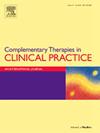Integrating traditional and modern Practices: Qualitative perspectives from mental health professionals in Mexico
IF 2.2
3区 医学
Q2 INTEGRATIVE & COMPLEMENTARY MEDICINE
引用次数: 0
Abstract
Background and purpose
In Mexico, traditional practices like herbal remedies, spiritual rituals, and energy-based therapies remain integral to mental health care. These are deeply rooted in cultural beliefs and often coexist with modern treatments. This study explores mental health professionals’ perspectives on the prevalence, factors influencing, and integration of traditional practices into modern psychiatric care.
Materials and methods
This qualitative phenomenological study is part of a broader investigation into sociocultural factors in Mexican mental health care. Participants were selected through convenience and snowball sampling. Data were gathered through 1-hour semi-structured interviews, covering various aspects of mental health care. This analysis specifically focused on participants' discussions about traditional treatments, which were identified and extracted from the transcripts for thematic analysis.
Results
The study highlighted a wide range of traditional practices used by patients, including spiritual healing, energy therapies, medicinal plants, psychedelics, and complementary therapies. Factors influencing the use of these practices included cultural beliefs, emotional motivations, and issues within the healthcare system. Mental health professionals had varied attitudes toward these practices: most were respectful but did not integrate them into treatment, some were skeptical of their safety, and a few adopted an integrative approach, incorporating traditional practices into care.
Conclusion
The study emphasizes the widespread use of traditional therapies in Mexico, influenced by cultural beliefs and gaps in access to modern care. While most professionals respect these practices, integrating them with evidence-based approaches requires a balance between cultural sensitivity and scientific validation, which is essential for providing comprehensive, culturally appropriate care.
整合传统和现代做法:墨西哥精神卫生专业人员的定性观点
背景和目的在墨西哥,草药疗法、精神仪式和能量疗法等传统做法仍然是精神卫生保健不可或缺的一部分。这些都深深植根于文化信仰,并经常与现代治疗共存。本研究探讨了精神卫生专业人员对精神病学的流行、影响因素以及将传统做法融入现代精神病学护理的观点。材料和方法本定性现象学研究是对墨西哥精神卫生保健中的社会文化因素进行更广泛调查的一部分。通过方便抽样和滚雪球抽样的方式选择参与者。通过1小时半结构化访谈收集数据,涵盖精神卫生保健的各个方面。该分析特别关注参与者对传统治疗方法的讨论,这些讨论从记录中被识别并提取出来用于主题分析。结果该研究强调了患者使用的广泛的传统做法,包括精神治疗、能量疗法、药用植物、迷幻剂和补充疗法。影响这些做法使用的因素包括文化信仰、情感动机和医疗保健系统内的问题。精神卫生专业人员对这些做法的态度各不相同:大多数人表示尊重,但没有将其纳入治疗,有些人对其安全性持怀疑态度,少数人采取综合方法,将传统做法纳入护理。结论:该研究强调了墨西哥传统疗法的广泛使用,受文化信仰和获得现代护理的差距的影响。虽然大多数专业人员尊重这些做法,但将它们与循证方法相结合需要在文化敏感性和科学验证之间取得平衡,这对于提供全面、文化上适当的护理至关重要。
本文章由计算机程序翻译,如有差异,请以英文原文为准。
求助全文
约1分钟内获得全文
求助全文
来源期刊

Complementary Therapies in Clinical Practice
INTEGRATIVE & COMPLEMENTARY MEDICINE-
CiteScore
6.30
自引率
6.70%
发文量
157
审稿时长
40 days
期刊介绍:
Complementary Therapies in Clinical Practice is an internationally refereed journal published to meet the broad ranging needs of the healthcare profession in the effective and professional integration of complementary therapies within clinical practice.
Complementary Therapies in Clinical Practice aims to provide rigorous peer reviewed papers addressing research, implementation of complementary therapies (CTs) in the clinical setting, legal and ethical concerns, evaluative accounts of therapy in practice, philosophical analysis of emergent social trends in CTs, excellence in clinical judgement, best practice, problem management, therapy information, policy development and management of change in order to promote safe and efficacious clinical practice.
Complementary Therapies in Clinical Practice welcomes and considers accounts of reflective practice.
 求助内容:
求助内容: 应助结果提醒方式:
应助结果提醒方式:


